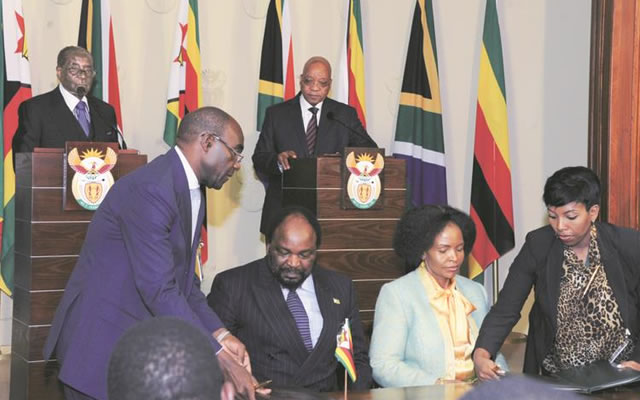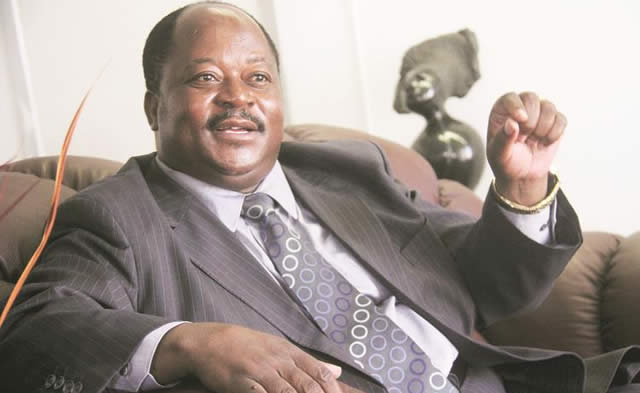‘Ownership precedes beneficiation’

 Mabasa Sasa recently in TSHWANE, South Africa
Mabasa Sasa recently in TSHWANE, South Africa
AFRICA’S dream of industrialisation through beneficiation of minerals, metals and agricultural produce is doomed to fail if the continent does not in the first place fully own and control those resources, President Mugabe has said.
The African Union and Sadc Chair made these remarks at a meeting of the South Africa-Zimbabwe Business Forum in Tshwane yesterday — remarks that were well-received by the hundreds of delegates gathered to hear his address.
President Mugabe was in South Africa’s capital at the invitation of President Jacob Zuma on a historic two-day State visit that started on Wednesday.
An equally fired-up President Zuma also addressed the business forum and similarly elicited applause when he said African governments must not be afraid of using their political power to push through policies that benefit indigenous peoples.
In his unscripted address, President Mugabe said, “The agenda shall be a sustained agenda of adding value, but we must win the natural resources first and make them our own so that we produce from our own natural resources. We must own the natural resources first, make them our own, hence indigenisation and empowerment. You indigenise, take (control of resources). There has to be, at the base of beneficiation, ownership by the people.”
He also said, “All industrialisation (in Africa) was done in the interest of the whites and all our mines (are still) controlled, not even by local whites, but by (those) outside. The very people you fought against (remain) in control of the economy . . . The black man is on his own.”
President Zuma said the political leadership should be unapologetic of using its democratic mandate to craft laws that empower the indigenous majority.
He averred that if white settlers had remained in power, they would not be apologetic about promoting their own interests as they had already demonstrated during the time of colonialism and apartheid.
President Zuma said the black majority government in South Africa had attempted to water down its policies and avoid radicalism in the hope that this would create goodwill with the former oppressors and Western countries, but even those huge gestures and sacrifices had been met with resistance — hence the realisation that there was no need to be apologetic about empowerment.
Abandoning his prepared speech to drive home his point, he said: “To me the struggle to liberate ourselves economically is a crucial one. We should be as angry about this struggle as we were for the political liberation. It’s urgent, it’s important, it’s correct.” After addressing the business forum, President Mugabe went to the Hector Pietersen Memorial in Soweto to pay his respects to those murdered by apartheid security forces in the 1976 Sharpeville massacre.
In Soweto, he was greeted by hundreds of people who saluted him with raised fists before he rounded up his State visit.
President Mugabe returned from the highly successful mission last night after steering through three landmark agreements and two memoranda of understanding with South Africa, putting to shame claims by sections of the private media that he was in the neighbouring country to “beg for a bailout”.
The key agreement was on establishment of a Bi-National Commission signed by Zimbabwe Foreign Affairs Minister Simbarashe Mumbengegwi and South Africa International Relations Minister Maite-Nkoana Mashabane. The two ministers also signed an MoU on Diplomatic Consultations.
Zimbabwe and South Africa on Wednesday finalised the agreements on Mutual Assistance Between Customs Administrations; Co-operation on Water Resources Management and functioning of the Joint Water Commission; and an MoU on Economic and Trade Co-operation.
Presidents Mugabe and Zuma both expressed their confidence that the agreements would result in mutual development and better livelihoods for their citizens.
President Mugabe was accompanied by First Lady Amai Grace Mugabe, 10 ministers and senior Government officials.
On landing at Harare International Airport, President Mugabe was received by Vice-President Emmerson Mnangagwa, Harare Metropolitan Provincial Affairs Minister Miriam Chikukwa, Economic Planning Minister Simon Khaya-Moyo, service chiefs and senior Government officials.









Comments